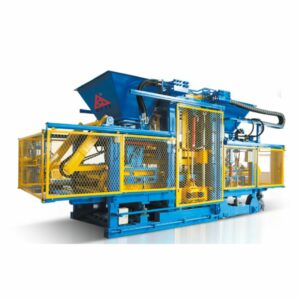How does the energy efficiency of a block making machine affect its performance?
The energy efficiency of a block making machine can significantly impact its overall performance in several ways:
- Operational Costs: Energy consumption is a significant operating cost for block making machines. A more energy-efficient machine will consume less power during operation, resulting in lower energy bills and reduced operating expenses. This can lead to improved profitability and cost-effectiveness for the manufacturer or operator.
- Production Efficiency: Energy-efficient block making machines often utilize advanced technologies and design features to optimize energy usage while maintaining high production rates. By minimizing energy waste and maximizing energy utilization, these machines can operate more efficiently and consistently, leading to higher productivity and throughput.
- Environmental Impact: Energy-efficient block making machines consume less electricity or fuel, resulting in reduced greenhouse gas emissions and environmental impact. This aligns with sustainability goals and regulatory requirements aimed at reducing carbon emissions and mitigating climate change. block making machine china Additionally, energy-efficient machines may qualify for environmental certifications or incentives, further enhancing their appeal to environmentally conscious customers.
- Reliability and Durability: Energy-efficient block making machines may incorporate features such as improved insulation, optimized heating elements, and efficient motor systems. These enhancements can contribute to the machine’s overall reliability and durability by reducing thermal stress, minimizing wear and tear on components, and extending service life. A more robust and dependable machine can enhance overall performance by reducing downtime and maintenance requirements.
- Market Competitiveness: In today’s competitive market, energy efficiency has become a significant differentiator for manufacturers of block making machines. Energy-efficient machines are often perceived as more advanced, technologically sophisticated, and environmentally responsible, enhancing their market appeal and competitiveness. Customers may prioritize energy efficiency when selecting a block making machine, giving an edge to manufacturers that offer energy-efficient solutions.
Overall, the energy efficiency of a block making machine is closely intertwined with its performance, operational costs, environmental impact, and market competitiveness. By prioritizing energy efficiency in machine design, block making machine for sale manufacturers can deliver products that offer improved productivity, sustainability, and value to their customers.
What are the quality control measures implemented in a block making machine to ensure consistent block quality?
Quality control measures are essential in block making machines to ensure consistent block quality. Here are some common measures implemented in these machines:
- Raw Material Testing: Before production begins, raw materials such as aggregates, cement, and additives are tested for quality and consistency. This ensures that only materials meeting specified standards are used in block production.
- Batching Accuracy: Block making machines often feature precise batching systems that accurately measure and mix raw materials in the correct proportions. Automated batching systems reduce human error and ensure consistent block quality by maintaining precise material ratios.
- Vibration Control: Vibration is a critical aspect of block making machines as it helps compact the mixture and remove air voids, ensuring uniform block density and strength. Quality control measures may include systems to monitor and regulate vibration frequency, intensity, and duration to achieve consistent compaction and block quality.
- Mold Alignment and Dimension Control: Proper alignment and dimension control of molds are crucial for producing blocks with uniform shape and size. Block making machines may incorporate mechanisms to ensure precise mold alignment and dimensional accuracy, such as adjustable mold guides and sensors for real-time monitoring.
- Curing and Drying Control: Consistent curing and drying processes are essential for achieving optimal block strength and durability. China block machines Block making machines may feature controlled curing chambers or drying systems with precise temperature, humidity, and airflow regulation to ensure uniform curing and drying conditions for all blocks.
- Quality Inspection and Testing: Automated inspection systems may be integrated into block making machines to inspect finished blocks for defects such as cracks, voids, or dimensional inconsistencies. These systems use sensors, cameras, or other detection methods to identify and reject defective blocks, ensuring only high-quality blocks are delivered to customers.
- Process Monitoring and Data Logging: Block making machines may include monitoring and data logging capabilities to track process parameters such as material flow rates, vibration settings, curing temperatures, and production rates. This data can be analyzed to identify trends, optimize machine settings, and address any deviations from quality standards.
- Regular Maintenance and Calibration: Proper maintenance and calibration of block making machines are essential for ensuring consistent performance and block quality over time. Regular inspections, cleaning, lubrication, and calibration of machine components help prevent wear and tear, minimize downtime, and maintain optimal operation.
By implementing these quality control measures, block making machines can consistently produce high-quality blocks that meet industry standards and customer requirements. This helps build trust and confidence in the reliability and performance of the machines, leading to satisfied customers and long-term success for manufacturers.

Comments are Disabled